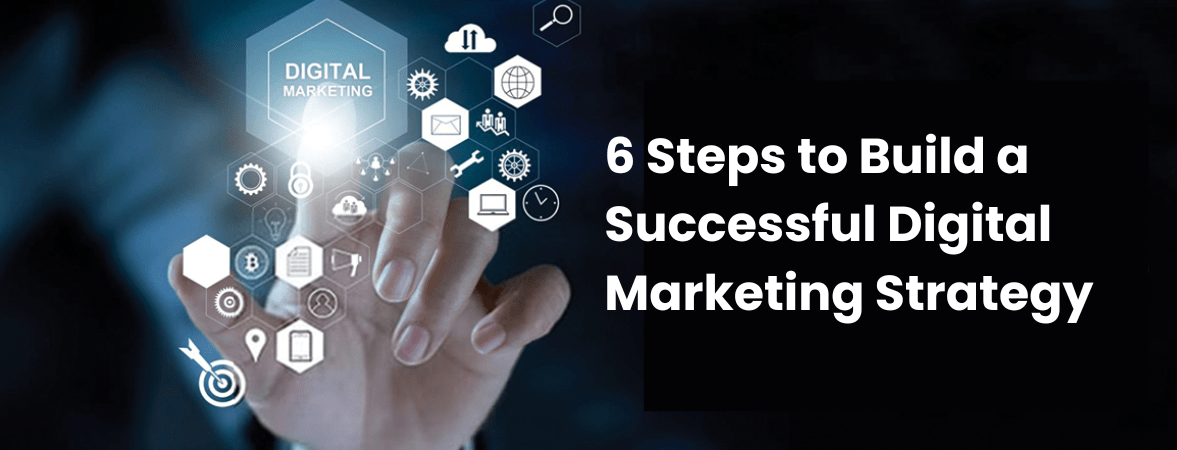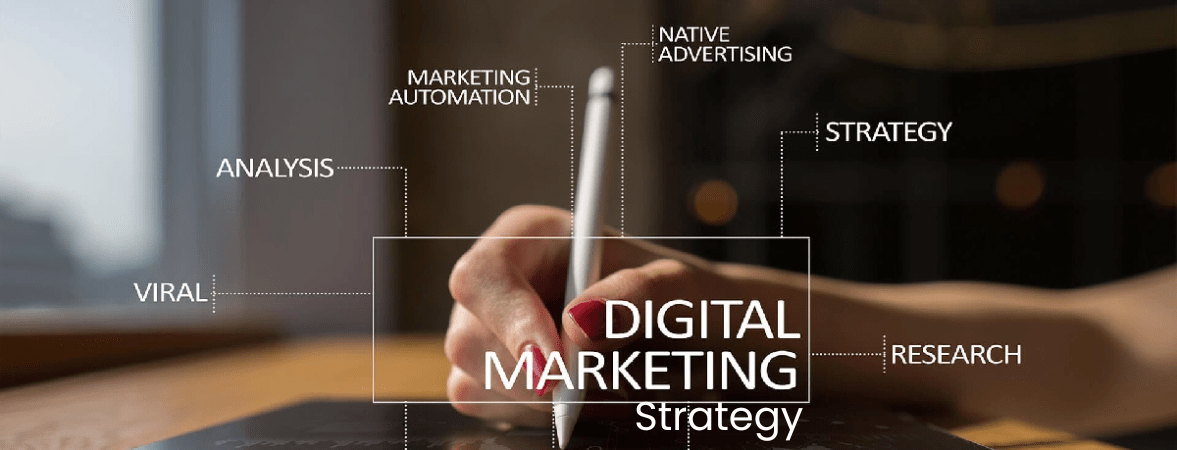
Quick Summary: In this Blog is about Digital marketing efforts is a critical component of any successful strategy. Without proper tracking and data analysis, you'll be operating blindly, unable to determine what's working and what needs improvement.

In the ever-evolving digital landscape, businesses must adapt and embrace effective digital marketing strategies to stay ahead of the competition. A well-crafted digital marketing strategy serves as a roadmap, guiding businesses to effectively reach and engage with their target audience across various online platforms. This comprehensive guide aims to provide a step-by-step approach to building a successful digital marketing strategy, covering everything from defining clear goals and objectives to measuring and analyzing performance.
Measuring and analyzing the performance of your digital marketing efforts is a critical component of any successful strategy. Without proper tracking and data analysis, you’ll be operating blindly, unable to determine what’s working and what needs improvement. It’s like trying to navigate a complex maze without a map or compass.
Establish clear Key Performance Indicators (KPIs) that align with your specific goals and objectives. These metrics could include website traffic, conversion rates, social media engagement, lead generation, and revenue figures. Leverage powerful web analytics tools like Google Analytics to track and monitor these KPIs over time, allowing you to identify patterns, trends, and areas for optimization.
Regularly review and analyze the data, looking for channels, campaigns, or content that are driving the most engagement and conversions, as well as those that may be underperforming. Use these insights to refine your strategy, reallocate resources where necessary, and continuously improve your digital marketing efforts. Embracing a data-driven approach empowers you to make informed decisions, maximize the effectiveness of your campaigns, and ensure that your strategy remains aligned with your business goals.
Creating a successful digital marketing strategy requires a systematic approach and careful consideration of various factors. Follow these effective steps to ensure your digital marketing efforts yield maximum impact and achieve your desired goals:

Setting clear goals and objectives is the foundation of a successful Digital Marketing Agency. Start by defining your overarching business objectives, such as increasing brand awareness, driving website traffic, generating leads, or boosting sales. Then, break down these broader goals into specific, measurable, achievable, relevant, and time-bound (SMART) objectives. For instance, if your goal is to increase brand awareness, your objective could be to achieve a 25% increase in social media followers within six months. Clear goals and objectives provide focus, direction, and a benchmark against which to measure your digital marketing efforts’ success. They also help align your team and ensure everyone is working towards the same desired outcomes.
Understanding your target audience is crucial for crafting an effective digital marketing strategy. Conduct thorough market research to gain insights into your audience’s demographics, interests, behaviors, and pain points. Analyze data from your existing customer base, social media platforms, website analytics, and industry reports. Identify their preferred channels for consuming content, the types of content they engage with, and the messaging that resonates with them. Create detailed buyer personas that represent your ideal customers, capturing their characteristics, motivations, and challenges. By deeply understanding your target audience, you can tailor your messaging, content, and overall strategy to speak directly to their needs and preferences, increasing the likelihood of capturing their attention and driving desired actions.
Choosing the right marketing channels is essential for maximizing the reach and impact of your digital marketing strategy. With numerous options available, such as social media, email marketing, search engine optimization (SEO), pay-per-click (PPC) advertising, content marketing, and influencer marketing, it’s crucial to select channels that align with your target audience’s preferences and behaviors.
Evaluate where your potential customers spend their time online and how they consume content. For instance, if your target audience is primarily active on visual platforms like Instagram and Pinterest, prioritize creating visually appealing content and leveraging influencer marketing. If they rely heavily on search engines, focus your efforts on SEO and PPC advertising. By aligning your channel selection with your audience’s behavior, you can effectively reach and engage them, increasing the chances of driving desired actions and achieving your marketing goals.
Crafting compelling content is the heart of an effective digital marketing strategy. High-quality, valuable, and engaging content not only attracts and retains your target audience but also establishes your brand as a trusted authority in your industry.
Develop a comprehensive content strategy that aligns with your goals and resonates with your audience. Understand the types of content they prefer, whether it’s educational blog posts, informative videos, visually appealing infographics, or entertaining social media updates. Ensure your content addresses their pain points, provides solutions to their problems, or inspires them in some way.
Leverage various content formats and distribution channels to cater to different preferences and consumption habits. Consistently create fresh, relevant, and engaging content that captivates your audience and encourages them to engage, share, and ultimately take the desired action, whether it’s making a purchase, signing up for a newsletter, or contacting your business.
Measuring and analyzing performance is a critical step in ensuring the success of your digital marketing strategy. Without proper tracking and analysis, you’ll have no way of knowing what’s working and what needs improvement.
Begin by establishing Key Performance Indicators (KPIs) that align with your goals and objectives. These could include metrics such as website traffic, conversion rates, social media engagement, lead generation, and revenue. Utilize web analytics tools like Google Analytics to track and monitor these metrics over time.
Regularly review and analyze the data to identify patterns, trends, and areas for optimization. Look for channels, campaigns, or content that are driving the most engagement and conversions, as well as those that may be underperforming. Use these insights to refine your strategy, reallocate resources where necessary, and continuously improve your digital marketing efforts.
By consistently measuring and analyzing performance, you can make data-driven decisions, maximize the effectiveness of your campaigns, and ensure that your digital marketing strategy remains aligned with your business goals.
The digital landscape is constantly evolving, with new trends, technologies, and consumer preferences emerging regularly. To ensure the long-term success of your digital marketing strategy, it’s essential to adapt and evolve continuously.
Stay up-to-date with industry changes, monitor your competitors’ strategies, and keep a pulse on emerging technologies and platforms that your target audience might be adopting. Be prepared to pivot your approach and incorporate new tactics or channels that align with these shifts.
Regularly review and analyze your performance data to identify areas for improvement or opportunities to capitalize on. Don’t be afraid to experiment with new content formats, marketing channels, or tactics that could potentially reach and engage your audience more effectively.
Embracing an agile mindset and being willing to adapt and evolve your digital marketing strategy is crucial for staying relevant, maintaining a competitive edge, and achieving sustained success in the ever-changing digital realm.
Building a successful digital marketing strategy is an ongoing process that requires continuous adaptation and evolution. As you implement the six steps outlined in this guide, remember to stay agile and responsive to changes in the digital landscape. Regularly review and analyze your performance data, identifying areas for improvement or new opportunities to capitalize on. Embrace experimentation and be willing to pivot your approach, incorporating new tactics, channels, or technologies that align with emerging trends and your target audience’s evolving preferences. By fostering a data-driven, adaptable mindset and consistently refining your digital marketing strategy, you’ll stay ahead of the curve, maintain a competitive edge, and achieve sustained success in the ever-changing digital realm. Embrace the power of digital marketing and watch your business thrive in the online world.
Join our growing community and get inspiring articles.
Our highly trained talented teams are committed to providing you with top-level, technical or any other support 24*7.
Ready to get started? Give us a call.